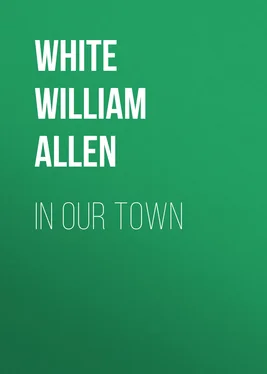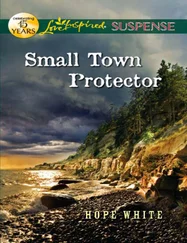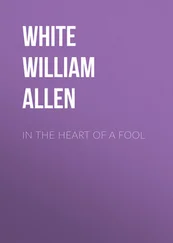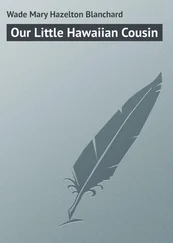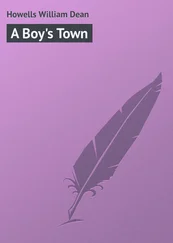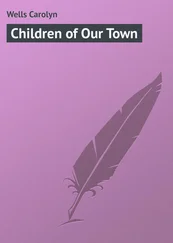William White - In Our Town
Здесь есть возможность читать онлайн «William White - In Our Town» — ознакомительный отрывок электронной книги совершенно бесплатно, а после прочтения отрывка купить полную версию. В некоторых случаях можно слушать аудио, скачать через торрент в формате fb2 и присутствует краткое содержание. Жанр: foreign_prose, foreign_antique, на английском языке. Описание произведения, (предисловие) а так же отзывы посетителей доступны на портале библиотеки ЛибКат.
- Название:In Our Town
- Автор:
- Жанр:
- Год:неизвестен
- ISBN:нет данных
- Рейтинг книги:5 / 5. Голосов: 1
-
Избранное:Добавить в избранное
- Отзывы:
-
Ваша оценка:
- 100
- 1
- 2
- 3
- 4
- 5
In Our Town: краткое содержание, описание и аннотация
Предлагаем к чтению аннотацию, описание, краткое содержание или предисловие (зависит от того, что написал сам автор книги «In Our Town»). Если вы не нашли необходимую информацию о книге — напишите в комментариях, мы постараемся отыскать её.
In Our Town — читать онлайн ознакомительный отрывок
Ниже представлен текст книги, разбитый по страницам. Система сохранения места последней прочитанной страницы, позволяет с удобством читать онлайн бесплатно книгу «In Our Town», без необходимости каждый раз заново искать на чём Вы остановились. Поставьте закладку, и сможете в любой момент перейти на страницу, на которой закончили чтение.
Интервал:
Закладка:
Still, this must be said of the "father," that it had a philosophy of life, and a distinct personality far deeper and more charming and in some way sweeter than David's; that it talked with an accent, which to the hearers seemed Italian, and in a voice that certainly could not have been the boy's by any trick of ventriloquism. One night in their talks Larmy said:
"'Father,' you say you believe that the judgments of God are just—how do you account for the sufferings, the heartaches, the sorrows, the misery that come in the wake of those judgments? Here is a great railway accident that strikes down twenty people, renders some cripples for life, kills others. Here is a flood that sweeps away the property of good men and bad men. Is that just? What compensation is there for it?"
The "father" put his chin in one hand and remained silent for a time, as one deep in thought; then he replied:
"That is—what you call—life. That is what makes life, life; what makes it different from the existence we know now. All your misfortunes, your hardships, your joys, all your miseries and failures and triumphs—these are the school of the soul which you call life. It is a preparation for the hereafter."
And David waking knew nothing of the thing that possessed him sleeping. When they told him, he would smoke his cigarette, and make reply that he must have had 'em pretty bad this time, or that he was glad he wasn't that "buggy" when he was awake.
David's talent soon became known in the office. We used to call it his spook, but only once did we harness it to practical business and that was when old Charley Hedrick, the local boss, was picking a candidate for the Legislature. The reporter and Larmy asked the "father" one night if it could get us connected with Mr. Hedrick. It said it would try; it needed help. And there appeared another personality with which they were more or less familiar, called the Jew. The Jew claimed to be a literary man, and said it would act as receiver while the father acted as transmitter on Hedrick. Then they got this one-sided telephonic conversation in a thick, wheezy voice that was astonishingly like Hedrick's:
"Harmony—hell, yes; we're always getting the harmony and the Worthington state bank gets the offices." Then a pause ensued. "Well, let'em bolt. I'm getting tired of giving up the whole county ticket to them fellows to keep 'em from bolting." After another pause, he seemed to answer someone: "Oh, Bill?—you can't trust him! He's played both sides in this town for ten years. What I want isn't a man to satisfy them, but just this once I want a man who won't be even under the suspicion of satisfying them. I want a fellow to satisfy me." The other side of the telephone must have spoken, for this came: "Well, then, we'll bust their damn bank! Did you see their last statement: cash down to fifteen per cent. and no dividends on half a million assets for a year and a half? Something's rotten there. They're a lot of 'toads in a poisoned tank,' as old Browning says. If they want a fight, they can have it." After the silence he replied: "I tell you fellows they can't afford a fight. And, anyway, there'll never be peace in this town till we get things on the basis of one bank, one newspaper, one wife and one country, and the way to do that is to get out in the open and fight. If I've got as much sense as a rabbit I say that Ab Handy is the man, and whether I'm right or wrong I'm going to run him." He seemed to retort to some objector: "Yes, and the first thing you know he'd come charging up to the Speaker's desk with a maximum freight-rate bill, or a stock-yards bill—and where would I be? I tell you he won't stand hitched. He'll swell up like a pizened pup, and you couldn't handle him. Where'd any of us be, if the Representative from this county got to pawing the air for reform? I know Jake as though I'd been through him with a lantern." There must have been a discussion of some kind among the others, for a lengthy interim followed; then the voice continued: "Elect him?—of course we can elect him. I can get five hundred from the State Committee and we can raise that much down here. This is a Republican year, and we could elect Judas Iscariot against any of the eleven brethren this year on the Republican ticket, and I tell you it's Ab. You fellows can do as you please, but I'm going to run Ab."
Then, being full of political curiosity rather than impelled by a desire for psychological research, the reporter slipped out and waited in a stairway opposite the Exchange National Bank building until the light in Hedrick's law office was extinguished. Then he saw old Charley and his henchmen come out, one at a time, look cautiously up and down the street and go forth in different, devious ways. The story in our paper the next day of the candidacy of Ab Handy threw consternation into the ranks of the enemy. We had printed the conversation as it had occurred, after which five men publicly contended that one of their number was a traitor.
The summer browned the pastures, and the coming of autumn brought trouble for David Lewis, president of the Imperial Dancing Club, short-stop for the Maroons, snare-drummer in the band, and operator of linotypes. We who are at the period of life where love is a harvest forget the days of the harrow, and are prone to smile at the season of the seeding. We do not know that the heaviest burden God puts on a young soul is a burden of the heart. A travelling silk-salesman, with a haughty manner and a two-hundred-dollar job, saw the blonde in the Racket Store and began calling at her father's home like the captain of an army with banners. David, being only an armour-bearer at fifteen dollars a week, found heartbreak in it all for him. A girl of twenty is so much older than a boy of twenty-one that the blonde began to assume a maternal attitude toward the boy, and he took to walking afield on Sundays, looking at the sky in agony and asking his little "now-I-lay-me" God, what life was given to him for. He fabricated a legend that she was selling herself for gold, and when the haughty manner and the blonde sped by David's window behind jingling sleigh-bells that winter, David, sitting at the machine, got back proofs from the front office that looked like war-maps of a strange country. Moreover he let his matrices go uncleaned until they were beardy as wheat and the bill of repairs on the machine had begun to rise like a cat's back.
All of this may seem funny in the telling, but to see the little Welshman's heart breaking in him was no pleasant matter. The girls in the office pitied the boy, and hoped the silk-drummer would break her heart. The town and the Imperial Club, whereof David was much beloved, took sides with him, and knew his sorrow for their own. As for the blonde, it was only nature asserting itself in her; so David got back his little chip diamonds, and his bangle bracelet, and his copy of "Riley's Love Songs," and there was the "mist and the blinding rain" for him, and the snow of winter hardened on the sidewalks.
To console himself, the boy traded for a music-box, which he set going with a long brass lever. Its various tunes were picked in holes on circular steel sheets, which were fed into the box and set whirling with the lever. At night when Larmy wasn't enjoying what David called a spook-fest, the boy would sit in the office by the hour and listen to his music-box. He must have played "Love's Golden Dream Is Past" a hundred lonesome times that winter (it had been their favourite waltz—his and the girl's—at the Imperial Club), and it was a safe guess that if the boys in the office, as they passed the box at noon, would give the lever a yank, from the abdomen of the contrivance the waltz song would begin deep and low to rumble and swell out with all the simulation of sorrow that a mechanical soul may express.
As the winter deepened, Larmy and the reporter and the "father" had more and more converse. The "father" explained a theory of immortality which did not interest the reporter, but which Larmy heard eagerly. It said that science would resolve matter into mere forms of motion, which are expressions of divine will, and that the only place where this divine will exists in its pure state, eluding the so-called material state, is in the human soul. Further, the "father" explained that this soul, or divine will, exists without the brain, independent of brain tissue, as may be proved by the accepted phenomena of hypnotism, where the soul is commanded to leave the body and see and hear and feel and know things which the mere physical organs can not experience, owing to the interposition of space. The "father" said that at death the Divine Will commands the ripened seed of life to leave the body and assume immortality, just as that Will commands the seeds of plants and the sperm of animals to assume their natural functions. The Thing that talked through David's lips said that the body is the seed-pod of the soul, and that souls grow little or much as they are planted and environed and nurtured by life. All this it said in many nights, while Larmy wondered and the reporter scoffed and stuck pins in David to see if he could feel them. And the boy wakened from his dreams always to say: "Gimme a cigarette!" and to reach over and pull the lever of his music-box, and add: "Perfessor, give us a tune! Hen, the professor says he won't play unless you give me a cigarette for him."
Читать дальшеИнтервал:
Закладка:
Похожие книги на «In Our Town»
Представляем Вашему вниманию похожие книги на «In Our Town» списком для выбора. Мы отобрали схожую по названию и смыслу литературу в надежде предоставить читателям больше вариантов отыскать новые, интересные, ещё непрочитанные произведения.
Обсуждение, отзывы о книге «In Our Town» и просто собственные мнения читателей. Оставьте ваши комментарии, напишите, что Вы думаете о произведении, его смысле или главных героях. Укажите что конкретно понравилось, а что нет, и почему Вы так считаете.
